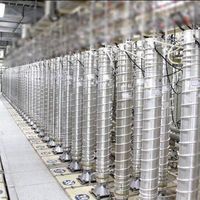Uninspiring Presidential Debates in Iran Reveal Weak Candidates
Iranian media and most social media users agree that the second and third televised "debates" among the six hand-picked presidential candidates in Iran last week were even more disappointing than the first one.
As the candidates prepare for their fourth debate on Monday, which will focus on foreign policy, observers are eager to see if any interesting issues or statements will emerge.
Many Iranian journalists, such as Sahand Iranmehr hesitated to call the second debate a "debate" as it was a series of individual monologues or sometimes a conversation between two of the candidates, Rouydad24 website observed.
Among the many problems noted by the media and netizens were the slow pace of the debates, the overly long introduction covering the candidates' arrival, prayers, and their walk through the state TV building, their awkward mumbling of the national anthem (which few knew by heart), and the repetitive, uninspired introduction by the state TV anchor. Even more annoying was the way the candidates were treated like naughty schoolboys in need of constant advice.
Regarding the form and format, these programs seem designed to discourage viewership. Everything about the setting is dull, tasteless, and rather banal. The scheduled 12-minute intermission on Thursday stretched to over half an hour, during which a helpless presenter repeated irrelevant information four times before the candidates returned to the studio, some still chewing the snacks offered by the organizers.
However, the content of the "debates" was even more problematic than the format. There was no meaningful difference among the candidates or their statements. Nearly everyone, except for cleric Mostafa Pourmohammadi in the second debate, who briefly outlined his plans for the presidency, seemed clueless about what they would do if elected.
Many, including the reformist candidate Masoud Pezeshkian said they did not need a plan because they were going to go ahead carrying out Supreme Leader Ali Khamenei's master plan for the country's future.
On the other hand, there was hardly any good speaker among them apart from Pourmohammadi. Some like Mohammad Bagher Ghalibaf and Alireza Zakani had many blunders that social media users joked about later. Zakani's remarks about helping pregnant women turned out to be too embarrassing while his remarks about giving gold to citizens in lieu of cash handouts were so outlandish that it was evident even in the mimics of other candidates.
Pezeshkian even did not defend himself against many attacks by his political rivals particularly Zakani, news websites in Tehran noted. His only significant statement was that he wanted to continue the path started by former reformist President Mohamad Khatami in the late 1990s. This prompted Zakani to say sarcastically that if Pezeshkian is elected president, his government will be Khatami's third term of office as President.
Former President Hassan Rouhani and former Roads and Urban Planning Minister Abbas Akhundi were so offended by some of the remarks made by conservative candidates that they asked for airtime to respond the accusations. As candidates have been "ordered" not to criticize the Raisi administration, they often make offensive remarks about Rouhani and his ministers and blame them even for problems that occurred under the Raisi administration.
Most of chronic problems the country faces, such as a 50% annual inflation rate, are largely the result of US economic sanctions, related to Iran’s nuclear program that is not the domain of any president to decide.
Many critics have noted that pro-reform candidate Masoud Pezeshkian's insistence on not differentiating himself from the conservative candidates is likely to negatively impact voter turnout in the upcoming election. Disillusioned voters may see no positive impact from his election.
Overall, the three rounds of debates on state TV have highlighted several issues with the candidates. They are not effective speakers, lack clear plans, and appear out of touch with Iranian society, showing little understanding of what Iranians want. They tend to create controversies because they have little to discuss about essential issues. Most importantly, none of them seem to have a clear reason for wanting to be Iran's President.








